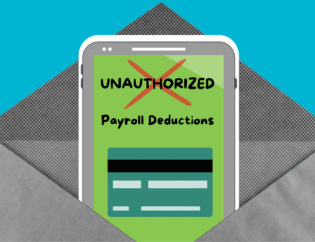
There are mandatory and approved payroll deductions that are deducted to the employee’s paycheck each payroll period. Approved payroll deductions refer to authorized deductions from an employee's salary or wages. These deductions are typically agreed upon between the employer and the employee and are deducted from the employee's paycheck before the employee receives their paycheck.
Common types of approved payroll deductions include the following:
- FICA – FICA or the Federal Insurance Contributions Act are payroll deductions for Social Security tax and Medicare tax. Both the employee and employer contribute to FICA tax equally. Public health is funded by FICA payments. People who are retired, disabled, or the families of the deceased receive benefits through Social Security taxes. Hospice care and home health care are two hospital-related benefits that Medicare covers.
- Federal and State Taxes – Federal taxes are imposed by the U.S. federal government and are used to fund various government programs and services at the national level. This tax comes from income taxes and payroll taxes. Meanwhile, state taxes are imposed by individual states to generate revenue for state-level programs and services. Both taxes go toward public services.
- Wage garnishments - Wage garnishments are necessary if one of your employees has an unpaid debt. If you need to withhold garnishments from an employee’s paycheck, you will receive an order from a court or government agency with more information. Garnishments can range from 15% – 70% of an employee’s paycheck, depending on their debt. Other deductions under garnishments may include child support or alimony if any. This must not exceed 50 percent to 65 percent as detailed in 5 CFR 581.402.
Employees can decide to have payroll deductions made voluntarily in addition to the obligatory deductions. As long as the deduction is permitted by law, the employee willingly contributes it in writing before employment begins, along with a few other prerequisites, and the US will accept it.
Some examples of voluntary payroll deductions are:
- Savings bonds
- Prepayment of loans to purchase credit shares in the union
- Prepayment of wages as long as the employee gets to use the funds as they see fit
- Prepayment of contributions that are voluntary to organizations
- Life and health insurance premiums
- Donations or charitable contributions
- 401k retirement plan contributions
- Flexible Spending Accounts (FSA): Deductions for pre-tax contributions to an FSA for healthcare or dependent care expenses.
It's important to note that the availability of voluntary payroll deductions and the specific programs offered may vary depending on the employer's policies and the state's regulations. Employees should consult their employer's policies or speak with their human resources department to understand the voluntary deductions available to them.
To maintain accuracy and compliance with relevant rules and regulations, it is crucial that both employers and employees have clear communication and documentation on permitted payroll deductions.










